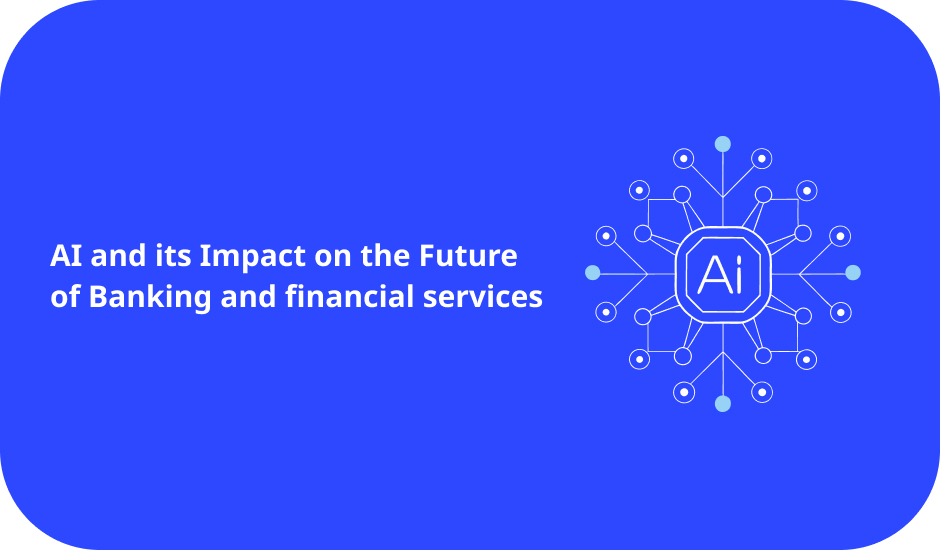
Artificial Intelligence (AI) is revolutionizing various industries, including banking and financial services. AI technology involves creating smart machines capable of tasks typically done by humans, like problem-solving, learning, and decision-making. By using algorithms to analyze data and recognize patterns, AI can predict outcomes.
The use of AI in banking and finance has grown significantly in recent years. With advancements in machine learning and natural language processing, AI is now more effective in personalization, fraud detection, risk management, and customer service. Currently, 35% of companies are already using AI, and 42% are exploring its future implementation.
Despite the benefits AI brings, concerns over data privacy and regulation have emerged with its increased adoption in the financial sector. This article delves into the Impact of AI on the Future of banking and financial services, examining both the advantages and risks associated with AI in these fields. It also touches on the significance of blockchain technology and the need for transparent AI practices.
The use of AI in banking and finance has grown significantly in recent years. With advancements in machine learning and natural language processing, AI is now more effective in personalization, fraud detection, risk management, and customer service. Currently, 35% of companies are already using AI, and 42% are exploring its future implementation.
Despite the benefits AI brings, concerns over data privacy and regulation have emerged with its increased adoption in the financial sector. This article delves into the Impact of AI on the Future of banking and financial services, examining both the advantages and risks associated with AI in these fields. It also touches on the significance of blockchain technology and the need for transparent AI practices.
AI Applications in Banking and Financial Services
As Artificial Intelligence (AI) progresses, diverse AI types like machine learning, natural language processing, and computer vision are finding utility across various sectors. Machine learning, especially, is gaining traction in the banking and financial services domain.
AI plays a crucial role in fraud detection within the banking and financial services sector. Through AI-driven algorithms, large datasets are scrutinized to pinpoint potential fraudulent activities, thereby averting monetary losses for financial institutions and safeguarding customers.
Moreover, AI aids in risk management, notably in assessing credit risk. By analyzing credit history data and other relevant factors, AI facilitates more precise evaluations of credit risk, empowering financial institutions to make well-informed lending decisions.
Furthermore, AI revolutionizes customer service in banking and financial services. Chatbots and virtual assistants, fueled by AI capabilities, deliver round-the-clock assistance to customers, ensuring prompt resolution of their concerns.
Moreover, AI aids in risk management, notably in assessing credit risk. By analyzing credit history data and other relevant factors, AI facilitates more precise evaluations of credit risk, empowering financial institutions to make well-informed lending decisions.
Furthermore, AI revolutionizes customer service in banking and financial services. Chatbots and virtual assistants, fueled by AI capabilities, deliver round-the-clock assistance to customers, ensuring prompt resolution of their concerns.
AI's Influence on the Sector
AI enhances the personalization and efficiency of solutions in banking and financial services, yet privacy and regulatory apprehensions prevail. As AI algorithms grow sophisticated, upholding ethical and transparent usage becomes imperative.
Combining blockchain technology with AI fortifies system security and transparency. Additionally, the rise of explainable AI underscores the importance of comprehensible and auditable AI systems.
Combining blockchain technology with AI fortifies system security and transparency. Additionally, the rise of explainable AI underscores the importance of comprehensible and auditable AI systems.
The Potential of AI to Transform the Banking and Financial Services Sector
The banking and financial services industry stands on the cusp of significant change facilitated by the progress of artificial intelligence (AI) and machine learning (ML) technologies. AI and ML have the capacity to revolutionize the sector by enhancing customer experience, reducing operational expenses, and bolstering security.
Enhanced Customer Experience
AI can deliver tailored financial guidance to customers based on their spending patterns, investment objectives, and risk profiles. This personalization fosters improved customer satisfaction and loyalty while opening avenues for cross-selling and upselling. Additionally, AI-driven chatbots streamline customer service, offering swift assistance and minimizing wait times.
Reduced Operational Costs
By automating manual tasks like data entry and analysis, AI enhances efficiency and curtails labor expenses. Furthermore, AI-powered risk management solutions can proactively identify potential fraud or financial crimes, diminishing the necessity for manual oversight and investigation.
Heightened Security
AI and ML contribute to fortifying security protocols in the banking and financial services realm. For example, AI-fueled fraud detection systems swiftly and accurately flag fraudulent activities, mitigating financial risks for both institutions and their clientele.
Despite the manifold advantages AI brings to the banking and financial services sector, certain challenges necessitate attention. Data privacy and regulatory compliance are paramount considerations, given the collection and analysis of sensitive customer information. Moreover, the incorporation of explainable AI and blockchain technology can enhance decision-making transparency and accountability.
AI can deliver tailored financial guidance to customers based on their spending patterns, investment objectives, and risk profiles. This personalization fosters improved customer satisfaction and loyalty while opening avenues for cross-selling and upselling. Additionally, AI-driven chatbots streamline customer service, offering swift assistance and minimizing wait times.
Reduced Operational Costs
By automating manual tasks like data entry and analysis, AI enhances efficiency and curtails labor expenses. Furthermore, AI-powered risk management solutions can proactively identify potential fraud or financial crimes, diminishing the necessity for manual oversight and investigation.
Heightened Security
AI and ML contribute to fortifying security protocols in the banking and financial services realm. For example, AI-fueled fraud detection systems swiftly and accurately flag fraudulent activities, mitigating financial risks for both institutions and their clientele.
Despite the manifold advantages AI brings to the banking and financial services sector, certain challenges necessitate attention. Data privacy and regulatory compliance are paramount considerations, given the collection and analysis of sensitive customer information. Moreover, the incorporation of explainable AI and blockchain technology can enhance decision-making transparency and accountability.
Challenges and Solutions in AI Adoption
The integration of Artificial Intelligence (AI) and Machine Learning (ML) has revolutionized the banking and financial services sector, yet it presents its own set of challenges.
Challenges in AI Adoption:
Potential Solutions:
While the potential of AI and ML in banking and financial services is vast, overcoming these challenges is essential for successful adoption in the industry.
Challenges in AI Adoption:
- Data Privacy: Safeguarding sensitive customer data in compliance with regulations like GDPR and CCPA poses a significant challenge.
- Regulation: Meeting stringent banking regulations such as Basel III and MiFID II while ensuring the explainability and fairness of AI models is crucial.
- Ethical Concerns: Addressing biases within AI and ML models to prevent discrimination is a key focus for ethical AI practices in the industry.
Potential Solutions:
- Effective Data Management: Implementing robust data management practices like anonymization, minimization, and encryption is vital for data privacy and accurate AI model development.
- Regulatory Frameworks: Governments and regulatory bodies should strike a balance between innovation and data protection through comprehensive frameworks.
- Ethical Guidelines: Establishing ethical guidelines for AI model creation and deployment to ensure transparency, explainability, and fairness.
While the potential of AI and ML in banking and financial services is vast, overcoming these challenges is essential for successful adoption in the industry.
The Future of AI in Banking and Financial Services
As technology rapidly progresses, AI becomes indispensable in the banking and financial services landscape. With its capacity to analyze extensive data, detect patterns, and forecast trends, AI stands to transform how financial institutions operate.
From enhancing fraud detection and risk management to optimizing customer service and personalization, AI's impact is already tangible and poised for further evolution. As regulatory and privacy concerns are addressed, an influx of AI solutions is anticipated in the industry's future.
Conclusion
Implementing AI in banking and financial services offers enhanced efficiency, superior customer service, and improved risk management. While the benefits are significant, considerations regarding privacy and regulation must be carefully managed to ensure ethical and responsible AI utilization.
At BMP Global we provide our customers with many solutions that already implement AI and ML. If you want to get a free consultation, fill in the contact form.
As technology rapidly progresses, AI becomes indispensable in the banking and financial services landscape. With its capacity to analyze extensive data, detect patterns, and forecast trends, AI stands to transform how financial institutions operate.
From enhancing fraud detection and risk management to optimizing customer service and personalization, AI's impact is already tangible and poised for further evolution. As regulatory and privacy concerns are addressed, an influx of AI solutions is anticipated in the industry's future.
Conclusion
Implementing AI in banking and financial services offers enhanced efficiency, superior customer service, and improved risk management. While the benefits are significant, considerations regarding privacy and regulation must be carefully managed to ensure ethical and responsible AI utilization.
At BMP Global we provide our customers with many solutions that already implement AI and ML. If you want to get a free consultation, fill in the contact form.













